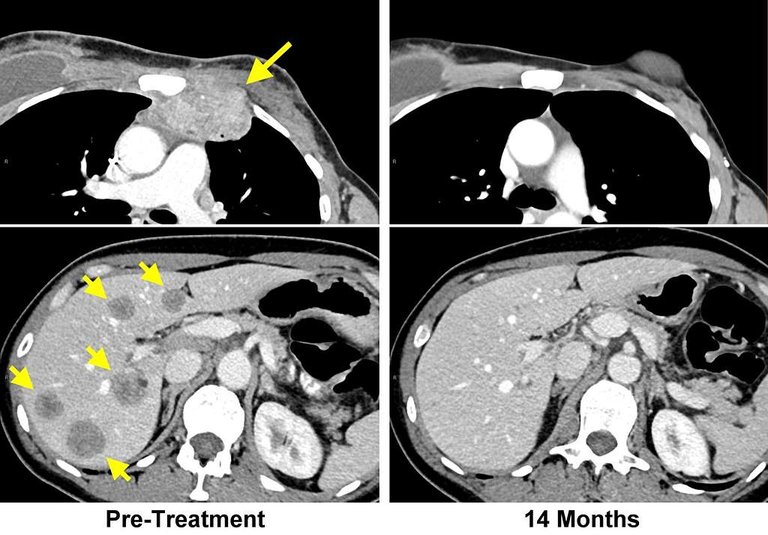Immunology - Unveiling the Enigma of Cancer
You must have heard of cancer, and currently it is regarded as the emperor of all maladies. For easy understanding, cancer occurs when healthy living cells become unhealthy and begins to grow without stopping as they continue to reproduce. The question we have now why do we get cancer, and are we going to be able to beat cancer.
In immunology and medicine, when it comes to systemic way of treatment, we have been able to make progress using chemical entities such as drugs to treat ourselves by killing the microorganism, and also the use of vaccines which makes the immune system to bear on an illness.
While the COVID-19 pandemic has taught us invaluable lessons about the potency of vaccines against viruses, a striking paradox emerges when we consider the application of vaccines in the context of cancer. Cancer and viruses are distinct adversaries, and the immune system plays a crucial role in both battles. However, the intricacies of the immune response differ significantly.
While using vaccine on cancer has an old history, we still aren't there yet. This is because our immune system which cantains lymphocytes among other things. the lymphocytes are made up of T-cells and B-Cells. The T-cells which are very good at recognizing the disease organisms especially viruses, and the B-cells, which produces antibodies against the viruses that have been identified by the T-cells and this is what vaccine uses to help the immune system.
Although this works for a lot of viruses, you would expect that the immune system is also able to recognize and fight cancers but then it is important to know that two cancer cells in the same location in two different individuals have lots of differences, as the cancer cells would possess genetic changes unique to the individuals they grow in. They are very individualize and this can even be a more disturbing reason for the delay with using vaccines on them.
We always generate tiny bad cells all the time in our body, but then our immune system spot them and kill them to prevent them from becoming large tumors but when they are able to escape the surveillance of the immune system, then they become this big cancer that is able to grow as they evade immune suppression.
Radiotherapy and Chemotherapy are what we use currently to treat cancers, with radiotherapy being the using of intense shining beams of radiation on a cancer to destroy the cancer, while chemotherapy is a form of using mild chemical poisons to kill the cells, preventing them from growing.
There have been lots of controversies over if certain cancer require treatments or not using the invasive methods of treatments, being that some studies claim that not treating prostrate cancer doesn't have significant difference in mortality. That said, it is also true that diets can affect our possible cause of cancer, thanks to the gut microbiome you have in your body. People who feed on fiber-based diets such as people living in Africa are less prone to having colon cancer compared to people feeding on fat-based diets.
With cancer immuno-oncology, treatments that strengthens the immune system is possible thereby helping to fight cancer but it is important to know that cancer isn't just one thing, it is a big umbrella term for events that occur when cells grow out of control. While there are different cancer treatments for different types of cancers, there is no universal cure for cancer.
Amid the labyrinthine world of cancer research, a ray of hope shines through. A study conducted by researchers at Cardiff University sheds light on the potential of killer T-cells to inflict substantial damage on cancer cells, leading to their demise. This discovery underscores the promising avenue of Car-T immunology, where genetically programmed T-cells are harnessed to target and treat specific cancer types. These T-cells utilize MR1 receptors to identify and destroy cancer cells, potentially opening new doors in the battle against cancer.
The battle against cancer is marked by complexity and nuance. It is a disease that defies simple solutions and demands a multifaceted approach. While the immune system, with its powerful lymphocytes and T-cells, provides a formidable defense against many adversaries, cancer's individualistic nature makes it a challenging foe. Current treatments have their benefits but come with their share of controversies and complexities.
- https://www.genome.gov/genetics-glossary/Lymphocytehttps://www.genome.gov/genetics-glossary/Lymphocyte
- https://www.ncbi.nlm.nih.gov/pmc/articles/PMC5091071/
- https://www.ncbi.nlm.nih.gov/pmc/articles/PMC6169832/
- https://www.ncbi.nlm.nih.gov/books/NBK459471/
- https://www.cancerresearchuk.org/about-cancer/what-is-cancer/body-systems-and-cancer/the-immune-system-and-cancer
- https://treatcancer.com/blog/difference-chemotherapy-radiation/
- https://www.cardiff.ac.uk/news/view/1749599-discovery-of-new-t-cell-raises-prospect-of-universal-cancer-therapy
- https://www.ncbi.nlm.nih.gov/pmc/articles/PMC3758138/
- https://fortune.com/well/2023/03/12/prostate-cancer-treatment-versus-long-term-monitoring-safe-study/
- https://www.ncbi.nlm.nih.gov/pmc/articles/PMC526387/
- https://www.ncbi.nlm.nih.gov/pmc/articles/PMC6312100/


Congratulations @oluwatobiloba! You have completed the following achievement on the Hive blockchain And have been rewarded with New badge(s)
Your next target is to reach 1300 posts.
You can view your badges on your board and compare yourself to others in the Ranking
If you no longer want to receive notifications, reply to this comment with the word
STOPTo support your work, I also upvoted your post!
Check out our last posts:
Thanks for your contribution to the STEMsocial community. Feel free to join us on discord to get to know the rest of us!
Please consider delegating to the @stemsocial account (85% of the curation rewards are returned).
Thanks for including @stemsocial as a beneficiary, which gives you stronger support.
Immunology is helping us uncover the mystery behind cancer, bringing new hope to men health. Understanding how the immune system responds to cancer can lead to better treatments and early detection. For men with low testosterone, oral testosterone treatment can support overall health and also aid the body ability to respond to disease. Balancing hormones plays an important role in maintaining health and strength.
https://www.rethinktestosterone.com/blog/testosterone-immune-health-flu-season
Posted by Waivio guest: @waivio_pearce-scott